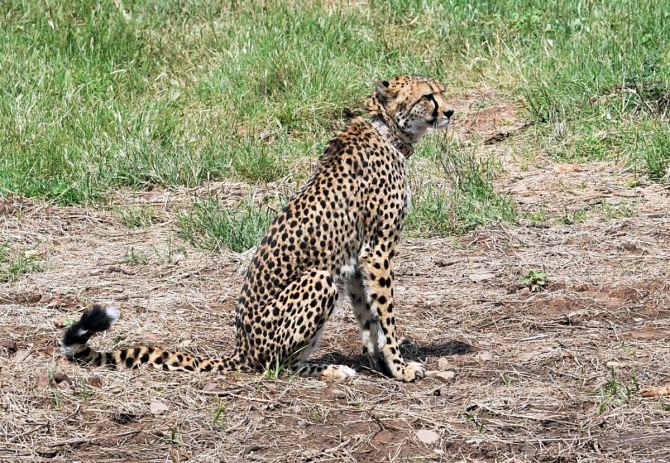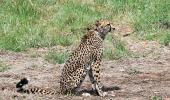A day after a Namibian cheetah died at the Kuno National Park in Madhya Pradesh, the Supreme Court on Tuesday sought details of experts in the cheetah task force such as their qualification and experience.

The four-and-a-half-year-old female cheetah, named Sasha, died due to a kidney ailment more than six months after she was translocated to the Kuno National Park from Namibia, along with seven other big cats.
A bench of Justices B R Gavai and Vikram Nath asked the Centre to furnish details of the experts in the task force who specialise in cheetah management, their experience and qualification within two weeks.
The top court's direction came while hearing an application filed by the Centre seeking direction from the court that it is no longer necessary and mandatory for the National Tiger Conservation Authority to continue taking the guidance and advice of the expert committee appointed by this court through an order dated January 28, 2020.
The top court had then said that the three-member committee comprising former director of wildlife protection M K Ranjit Sinh, chief conservator of forests, wildlife administration in Uttarakhand Dhananjai Mohan and the DIG (Wildlife) of the ministry of environment, forest and climate change will guide the NTCA in the introduction of African cheetahs in India.
Senior Advocate Prashanto Chandra Sen, appearing for the committee, said the Cheetah Task Force does not have any cheetah expert in the panel.
He said that since cheetahs have been brought, the NTCA should continue to work with the expert committee constituted by the apex court, at least for the initial level.
"Cheetahs have come and we have lost one of them. There is a need to have experts, who have wide knowledge and experience in cheetah management," he said.
Additional solicitor general Aishwarya Bhati, appearing for the Centre, said that the government has prepared a scientific action plan for introduction of cheetah in India.
"The action plan is a comprehensive scientific document prepared in consultation with scientists, veterinarians, forest officers and cheetah experts from India as well as other countries like Namibia, South Africa, United States of America, etc.," she said.
Bhati said that it cannot be a case that only their experts know everything and other experts do not know anything about cheetah management.
Justice Nath observed that nowadays the government is taking a lot of interest in wildlife protection.
The bench posted the matter after two weeks and asked Bhati to submit details of cheetah experts in the task force.
The Centre, in its application said that as per the action plan for cheetah introduction in India, annually 8-14 cheetahs are required to be brought in from African countries for the next five-years at least and an memorandum of understanding in this regard has been signed between government of India and Republic of Namibia and South Africa for cooperation in the field of cheetah conservation.
Giving the details, the Centre said that following the signing of the MOU, "in a historic wild to wild intercontinental translocation of large carnivore, eight cheetahs were transported from Namibia to India on September 17, 2022 and were released into the quarantine enclosures in Kuno National Park of Madhya Pradesh".
The government said that as per MoU with South Africa, 12 cheetahs -- seven males and five females -- were translocated from South Africa to KNP on February 18, 2023.
It said that this entire exercise of cheetah introduction in India has been carried out under the expert guidance and supervision of the International cheetah experts, scientists, veterinarians, forest officials and NTCA in consultations with the committee appointed by this court vide order dated January 28, 2020.
The Centre said that now that cheetahs have been introduced in India, "...there is no requirement of a continuing supervision/consultation with the expert committee appointed by this court as a substantial part of the introduction of cheetahs has already been undertaken and further steps will be taken on the basis of the scientific action plan for introduction of cheetah in consultation with the experts in the relevant field".
The government said that it is no longer necessary and mandatory for the NTCA to continue to take the guidance and advice of the expert committee.
"However, if at any stage NTCA requires the aid and advice of any expert(s), the same may be done as and when the need arises," it said.
On January 28, 2020, the top court had paved for introduction of African cheetah to a suitable habitat in India on an experimental basis to see whether it can adapt to Indian conditions.
Stating that the rare Indian cheetah is almost extinct in the country, the NTCA had sought the court's permission to relocate the African cheetah from Namibia.
On May 8, 2012, the top court stayed the decision of the ministry of environment, forest and climate change to import cheetahs from Africa into India for introducing them to KNP till a final decision on the question of reintroduction of lions is taken by the court.
On April, 15, 2013, the top court had quashed the order of the ministry to introduce African cheetah into Kuno saying that it has not conducted any detailed study before the passing the order of introducing foreign cheetah to Kuno, which is not a historical habitat for African cheetahs.
Thereafter in 2017, the Centre sought clarification of the April 15, 2013 order for permission to introduce cheetahs from Africa to suitable sites in India.
Thereafter, on the Centre's application on January 28, 2020, the court clarified, "At the outset, we find that the word 're-introduce' has been erroneously applied since it is an admitted fact that the African cheetahs never inhabited India. Therefore, if an attempt is made to relocate the African cheetah within the territory of India, it will amount to an 'introduction' of the African cheetah and not a 're-introduction'."
The top court had said that African cheetahs would be introduced on an experimental basis in a careful chosen habitat and nurtured and watched to see whether it can adapt to the Indian conditions and in case there are some difficulties noticed about the location in which it is introduced, the location would be changed to another forest which is more habitable for the animals.










 © 2025
© 2025